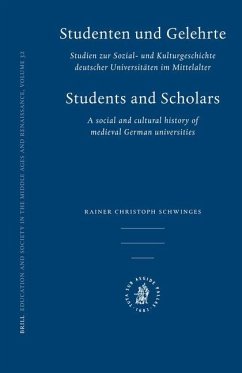Through the foundation of the universities at Prague (1348), the Roman-German Empire caught up with and integrated itself into the European cultural space of universities, one of the consequences being a constant rise of the number of students. The studies collected in this volume analyse the acceptance and social effects of this process, comparing German and European phenomena. They concentrate on university members, students and graduates of extremely different origins, following the parameters of status, parental ties, group affiliation, and networks: crucial moments include the access to university, studies and leisure activities, the converging aspects of social and academic hierarchy and finally the application of academic expertise in different professional environments. The main focus thus lies on the medieval universitiesa (TM) contribution to the creation of a modern "society of knowledge."
Bitte wählen Sie Ihr Anliegen aus.
Rechnungen
Retourenschein anfordern
Bestellstatus
Storno




